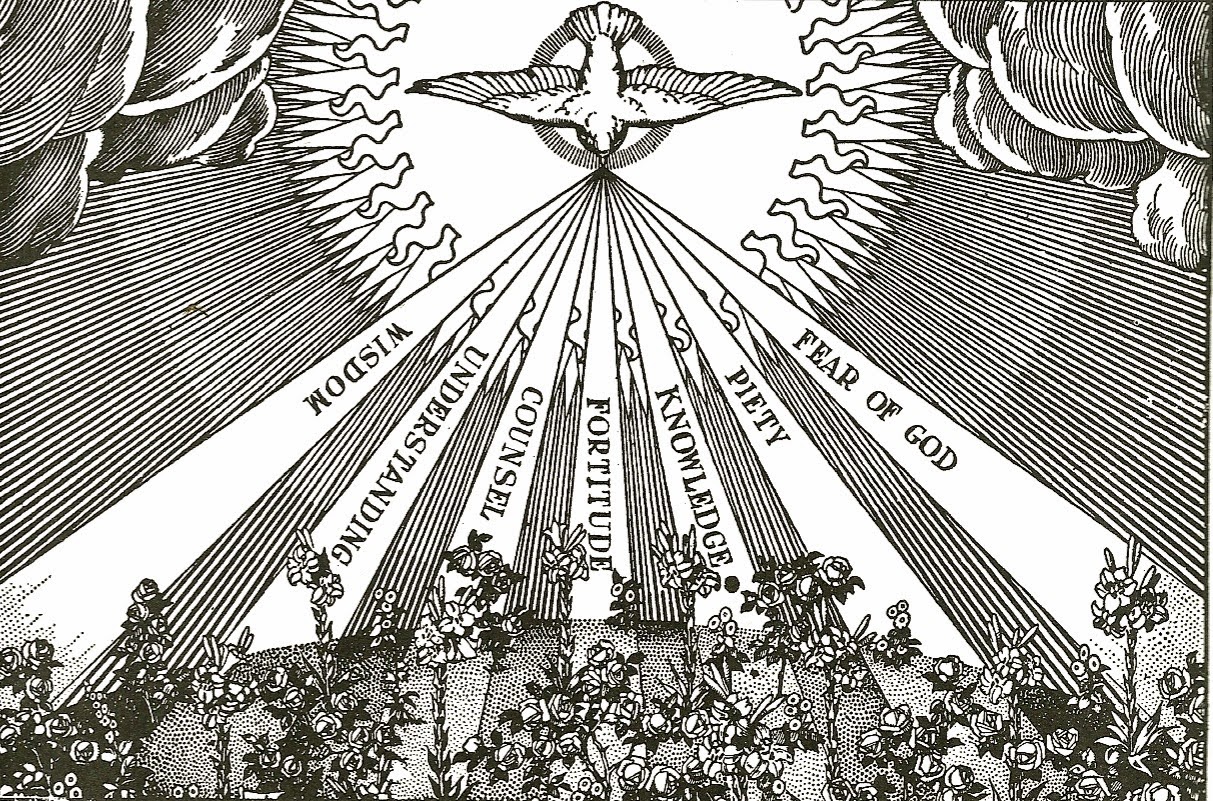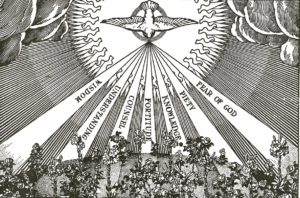Central idea: The Gift of the Holy Spirit. Doctrine: The unity of Easter, Pentecost, and the Eucharist. Practical application: The invocation of the Holy Spirit.
Lectionary 63.
Central idea: The Gift of the Holy Spirit
Reading 1 Acts 2:1-11
When the time for Pentecost was fulfilled,
they were all in one place together.
And suddenly there came from the sky
a noise like a strong driving wind,
and it filled the entire house in which they were.
Then there appeared to them tongues as of fire,
which parted and came to rest on each one of them.
And they were all filled with the Holy Spirit
and began to speak in different tongues,
as the Spirit enabled them to proclaim.Now there were devout Jews from every nation under heaven staying in Jerusalem.
At this sound, they gathered in a large crowd,
but they were confused
because each one heard them speaking in his own language.
They were astounded, and in amazement they asked,
“Are not all these people who are speaking Galileans?
Then how does each of us hear them in his native language?
We are Parthians, Medes, and Elamites,
inhabitants of Mesopotamia, Judea and Cappadocia,
Pontus and Asia, Phrygia and Pamphylia,
Egypt and the districts of Libya near Cyrene,
as well as travelers from Rome,
both Jews and converts to Judaism, Cretans and Arabs,
yet we hear them speaking in our own tongues
of the mighty acts of God.”
- On Pentecost morning Christ’s promise to send the Holy Spirit is fulfilled. He descends on them like “tongues as of fire.”
- “[F]ire symbolizes the transforming energy of the Holy Spirit’s actions.” Like fire which transforms what it touches into fire, the Holy Spirit also “transforms what he touches.” On the morning of Pentecost, the Holy Spirit rests on the disciples in the form of tongues ‘as of fire’ “and fills them with himself” (CCC 696).
- How are the Apostles transformed? They can now boldly speak about God in a way that everyone can understand, regardless of their geographical origin, and also regardless of their social condition: “whether they are Jews or Greeks, slaves or free persons” (1 Cor 12:13).
Responsorial Psalm Ps 104:1, 24, 29-30, 31, 34
R. Lord, send out your Spirit, and renew the face of the earth or Alleluia.
Bless the LORD, O my soul!
O LORD, my God, you are great indeed!
How manifold are your works, O LORD!
the earth is full of your creatures;May the glory of the LORD endure forever;
may the LORD be glad in his works!
Pleasing to him be my theme;
I will be glad in the LORD.If you take away their breath, they perish
and return to their dust.
When you send forth your spirit, they are created,
and you renew the face of the earth.
- One of the reasons men praise God’s greatness is because of his manifold living creatures.
- We creatures depend on God for existence. Every living thing dies and its body decomposes, but God continually gives new life by sending his creative spirit. Theologians call this God’s preservation. God did not just create the universe once long ago. His creation of creation is continuous. Every day is “the day the Lord has made” (Ps 118:24).
- But on Pentecost, something new happens. The new “creature” created on the day of Pentecost is the Church. The new breath which is in the disciples is the Holy Spirit. It gives life to the Church and renews her daily.
Reading 2 1 Cor 12:3b-7, 12-13
Brothers and sisters:
No one can say, “Jesus is Lord,” except by the Holy Spirit.There are different kinds of spiritual gifts but the same Spirit;
there are different forms of service but the same Lord;
there are different workings but the same God
who produces all of them in everyone.
To each individual the manifestation of the Spirit
is given for some benefit.As a body is one though it has many parts,
and all the parts of the body, though many, are one body,
so also Christ.
For in one Spirit we were all baptized into one body,
whether Jews or Greeks, slaves or free persons,
and we were all given to drink of one Spirit.
- The Holy Spirit makes each one of us members of the Body of Christ, his Church, despite any outward differences of race, creed of origin, ethnic group, social standing, or economic condition.
- The Holy Spirit does not just unite us to Christ and one another. He also gives every one of us spiritual gifts for some benefit—our own benefit and the benefit of others.
Or Gal 5:16-25
Brothers and sisters, live by the Spirit
and you will certainly not gratify the desire of the flesh.
For the flesh has desires against the Spirit,
and the Spirit against the flesh;
these are opposed to each other,
so that you may not do what you want.
But if you are guided by the Spirit, you are not under the law.
Now the works of the flesh are obvious:
immorality, impurity, lust, idolatry,
sorcery, hatreds, rivalry, jealousy,
outbursts of fury, acts of selfishness,
dissensions, factions, occasions of envy,
drinking bouts, orgies, and the like.
I warn you, as I warned you before,
that those who do such things will not inherit the kingdom of God.
In contrast, the fruit of the Spirit is love, joy, peace,
patience, kindness, generosity,
faithfulness, gentleness, self-control.
Against such there is no law.
Now those who belong to Christ Jesus have crucified their flesh
with its passions and desires.
If we live in the Spirit, let us also follow the Spirit.
- What does St. Paul mean by being under the law and not being under the law?
- The myriad evil acts Paul catalogues condemn one according to the moral law.
- However, when it comes to any grace-assisted natural virtue (like patience), or any supernatural virtue (like love), or any of their fruits (like joy), these can be practiced and enjoyed without any limit. They are wholly good.
- The Catechism says that the Holy Spirit “transforms what he touches” and fills those he touches “with himself” (CCC 696).
- What is this “himself” that those who are touched by the Holy Spirit receive?
- The Holy Spirit’s nature can be seen in the effect he has on men who “live in the Spirit” and “follow the Spirit”: “love, joy, peace, patience, kindness, generosity, faithfulness, gentleness, [and] self-control.”
Gospel Jn 20:19-23
On the evening of that first day of the week,
when the doors were locked, where the disciples were,
for fear of the Jews,
Jesus came and stood in their midst
and said to them, “Peace be with you.”
When he had said this, he showed them his hands and his side.
The disciples rejoiced when they saw the Lord.
Jesus said to them again, “Peace be with you.
As the Father has sent me, so I send you.”
And when he had said this, he breathed on them and said to them,
“Receive the Holy Spirit.
Whose sins you forgive are forgiven them,
and whose sins you retain are retained.”
- Easter and Pentecost are so close as to form one event. On the evening of the Resurrection, Our Lord gave his disciples the gift of the Holy Spirit. One manifestation of this was their power to forgive sins, something which, up till then, only God possessed.
Jesus said to his disciples:
“When the Advocate comes whom I will send you from the Father,
the Spirit of truth that proceeds from the Father,
he will testify to me.
And you also testify,
because you have been with me from the beginning.“I have much more to tell you, but you cannot bear it now.
But when he comes, the Spirit of truth,
he will guide you to all truth.
He will not speak on his own,
but he will speak what he hears,
and will declare to you the things that are coming.
He will glorify me,
because he will take from what is mine and declare it to you.
Everything that the Father has is mine;
for this reason I told you that he will take from what is mine
and declare it to you.”
- The apostles, back then, and the Magisterium of the Church, today, can testify to the truth of our salvation because of the gift of the Holy Spirit.
- This means that the laity can also testify to the truth, so long as what we say is agreement with the deposit of faith.
- Our souls can bless and glorify God because through the Holy Spirit we know the Son and through him the Father.
Doctrine: The unity of Easter, Pentecost, and the Eucharist
- The first reading recounts what happened on the morning of Pentecost, when the Holy Spirit descended upon the disciples accompanied by Mary, how they received this gift of tongues, and how they were emboldened to proclaim the Gospel. As the Communion antiphon puts it, “They were all filled with the Holy Spirit and spoke of the marvels of God.”
- Yet the Gospel recounts how fifty days earlier, on the evening of Easter Sunday, “the risen Lord breathed on his disciples and said, ‘Receive the Holy Spirit’” (Jn 20:22).
- “Easter is Pentecost.” This is to say, “Easter is already the gift of the Holy Spirit.” However, “Pentecost is the convincing manifestation of Easter to all the nations, uniting many tongues in one new language of understanding ‘the mighty acts of God’ (Acts 2:11) displayed in Jesus’ death and resurrection.”
- Today, the Church prays that in this Mass “the Holy Spirit may reveal to us more abundantly the hidden mystery of this sacrifice and graciously lead us into all truth” (Prayer over the Offerings). “This sacrifice” is the same event as the Last Supper and the Passion of Christ. The “all truth” is what Our Lord promised his disciples at the Last Supper, which was accomplished through the Holy Spirit.
- Our reception of Holy Communion today “becomes the Pentecost event” for us. We, too, are “all filled with the Holy Spirit” and can speak “of the marvels of God.” Thus, these scriptures are fulfilled in our worthy reception of the Eucharist.
- In this way, not only is Easter Pentecost, “Eucharist is Pentecost” (Homiletic Directory §56).
Practical Application: Invocation of the Holy Spirit
- When we receive the Eucharist well, that is, in a state of grace and with faith, we are once again infused with the Holy Spirit and can speak to others of the marvels of God.
- One thing we can do is to bask in the presence of the Holy Spirit by praying the sequence Veni, Sancte Spiritus each day this week. We recited this before the Gospel.
- Another is to learn and pray often the invocation of the Holy Spirit asking for the help of the Holy Spirit.
The Homiletic Directory suggests the following Catechism points and themes for the Solemnity of Pentecost:
- CCC 696, 726, 731-732, 737-741, 830, 1076, 1287, 2623: Pentecost
- CCC 599, 597,674, 715: apostolic witness on Pentecost
- CCC 1152, 1226, 1302, 1556: the mystery of Pentecost continues in the Church
- CCC 767, 775, 798, 796, 813, 1097, 1108-1109: the Church, communion in the Spirit


Leave a Reply